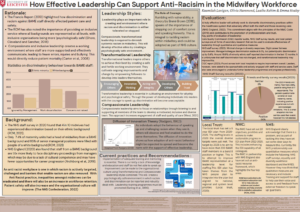A guest blog from Emma Healey, a midwifery student at the University of Leicester and one of the #150Leaders.
As a white student, it can be easy to forget the privilege that this affords. Many of us will be striving to reach leadership and management roles in our future careers, but some groups will automatically find it more difficult to progress. As a student midwife, looking at the senior leadership of my profession, a survey by the RCM (2021) showed that 85% of senior roles are filled by people from a white background. We must question if this is proportionate to our workforce and examine why this might be the case. Four in ten midwives report feeling discriminated against based on their ethnic background, in an organisation that claims to have zero-tolerance for racism (RCM, 2021). How is this still happening? Racism is not always presented overtly, it is often an undercurrent of biases and micro-aggressions. It is the overlooking of professionals for positions and the limitation of capable staff. Leadership is an essential element of caring professions for us all, but how can we use this to create an equitable and inclusive environment for everyone?
Allyship is using privilege to advocate for underrepresented people, but what does allyship look like? We must start with self-education to understand the racial dynamics at play. The works of Eddo-Lodge (2017) and Williams (2020) explore racism’s pervasive impact and offer proactive steps to engage in anti-racist work and help to dismantle systematic bias. Anti-racism is not only about avoiding racism yourself, it is about taking an active stance against discrimination. Many of us will have been bystanders to discrimination. It can feel daunting to intervene or take action against this. Brown’s (2018) work on courage and courageous conversations helps to contextualise how we can stand up and challenge discrimination when we encounter it. NHS England (2022) has produced an anti-racist framework which provides a toolkit to promote anti-racist practice. Likewise, the Council of Deans of Health (2023) compiled a guide on anti-racism in AHP education, spotlighting the experience of minority ethnic AHP students throughout their journey in higher education.
As people holding white privilege, it is our duty to look at ourselves in the mirror, learn about and understand the experience of our colleagues and take action to shine a light on discrimination. We must eliminate the systemic biases around us. We must actively put in work to balance the scales. Let us lift those around us, because together we are all stronger.
Emma and several of her fellow midwifery students at the University of Leicester have developed a poster on how effective leadership can support anti-racism in the midwifery workforce. Click on the image below to see details.
Below is a list of resources to aid in developing allyship:
Brown, B. (2018) Dare to Lead. London: Vermilion
Council of Deans of Health. (2023) Anti-racism in AHP Education: Building an Inclusive Environment.
Eddo-Lodge, R. (2017) Why I’m No Longer Talking to White People About Race. London: Bloomsbury Publishing.
NHS England. (2022) Combatting racial discrimination against minority ethnic nurses, midwives and nursing associates.
Royal College of Midwives (RCM). (2021) Position Statement Racism in the Workplace.
Williams, S. (2020) Anti-Racist Ally: An Introduction to Action and Activism. London: Harper Colins Publishers.

